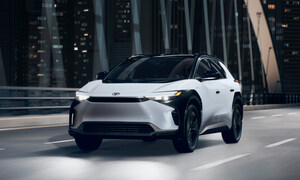Toyota to Collaborate with Redwood Materials on a Sustainable, Closed-Loop Electrified Vehicle Battery Ecosystem
Areas include end-of-life battery solutions for its battery ecosystem, including battery collection, testing & evaluation, remanufacturing, recycling and battery materials production
PLANO, Texas and CARSON CITY, Nev., June 21, 2022 /PRNewswire/ -- Toyota Motor North America (Toyota), as part of its commitment to reduce its environmental footprint year after year and achieve carbon neutrality by 2050, has embarked on a mission to create a sustainable, closed-loop battery ecosystem for its electrified powertrains. This mission focuses not only on the collection, testing and recycling of batteries into raw materials to create a sustainable supply chain, but also aims to develop second-life opportunities for remanufactured and repurposed Toyota hybrid electric vehicle batteries by leveraging battery health screening tools and empowering data from its vehicles.
In connection with these goals, Toyota and Redwood Materials (Redwood) will explore a series of end-of-life battery solutions for Toyota's proposed battery ecosystem. Initially, this collaboration will focus on the collection, testing and recycling of Toyota hybrid electric vehicle batteries. The companies will then look to expand into other areas such as battery health screening and data management, remanufacturing and battery material supply throughout North America.
"We are excited to be working with Redwood Materials to identify solutions for our electrified powertrains at the end-of-life that contributes to our vision of creating a sustainable, circular battery ecosystem," said Christopher Yang, group vice president of Business Development at Toyota. "We are committed to developing sustainable solutions that allow our batteries to provide value beyond the initial lifecycle in an electrified vehicle. This also contributes to our carbon neutrality goals and our mission to build a more sustainable world for all."
Redwood Materials is driving down the environmental footprint and cost of lithium-ion batteries by offering large-scale sources of domestic anode and cathode materials produced from recycled batteries. Redwood receives more than ~6 GWh of end-of-life batteries annually for recycling, which are then refined and remanufactured into critical battery materials. The company plans to ramp production of anode and cathode components in the US to 100 GWh annually by 2025, enough to produce more than one million electric vehicles a year. Together, Toyota and Redwood will investigate ways to seamlessly incorporate battery recycling through domestic battery materials manufacturing into Toyota's battery production strategy, beginning with North America.
"Toyota helped pave the way for clean transportation with the introduction of the Toyota Prius more than 20 years ago. Their commitment not only to sell millions of electrified vehicles this decade but to ensure their circularity into the future is a critical step for electrification," said JB Straubel, Redwood Materials founder and CEO. "Redwood and Toyota's shared vision to drive down the environmental footprint and cost of transportation will continue to accelerate the adoption and access to electric vehicles."
Toyota's production plans include new and increased automotive battery production in the United States. Recently Toyota announced an investment of $1.29 billion in a new North American battery plant, Toyota Battery Manufacturing, North Carolina (TBMNC). When completed, TBMNC is anticipated to produce battery packs for 1.2 million electrified vehicles per year. Toyota expects to sell eight million electrified vehicles globally by 2030 and invest $70B in their development.
About Toyota
Toyota (NYSE:TM) has been a part of the cultural fabric in the U.S. for more than 60 years, and is committed to advancing sustainable, next-generation mobility through our Toyota and Lexus brands, plus our nearly 1,500 dealerships.
Toyota directly employs more than 39,000 people in the U.S. who have contributed to the design, engineering, and assembly of nearly 32 million cars and trucks at our nine manufacturing plants. By 2025, Toyota's 10th plant in North Carolina will begin to manufacture automotive batteries for electrified vehicles. With the more electrified vehicles on the road than any other automaker, a quarter of the company's 2021 U.S. sales were electrified.
To help inspire the next generation for a career in STEM-based fields, including mobility, Toyota launched its virtual education hub at www.TourToyota.com with an immersive experience and chance to virtually visit many of our U.S. manufacturing facilities. The hub also includes a series of free STEM-based lessons and curriculum through Toyota USA Foundation partners, virtual field trips and more. For more information about Toyota, visit www.ToyotaNewsroom.com.
About Redwood Materials
Redwood Materials is creating a circular supply chain to drive down the environmental footprint and cost of lithium-ion batteries and the electric vehicles and sustainable energy storage systems they power. Founded by JB Straubel, the Nevada-based company is offering large-scale sources of domestic anode and cathode materials produced from recycled batteries. Redwood receives more than ~6 GWh of end-of-life batteries annually for recycling, which are then refined and remanufactured into critical battery materials. The company plans to ramp production of anode and cathode components in the US to 100 GWh annually by 2025, enough to produce more than one million electric vehicles a year.
Media Contacts
Toyota Motor North America
Josh Burns
[email protected]
Redwood Materials
Alexis Georgeson
[email protected]
SOURCE Toyota Motor North America

WANT YOUR COMPANY'S NEWS FEATURED ON PRNEWSWIRE.COM?
Newsrooms &
Influencers
Digital Media
Outlets
Journalists
Opted In






Share this article